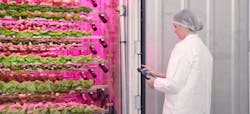Horticultural SSL news: Ospraie invests in CubicFarms; DLC revisions and more
Horticultural specialist CubicFarm Systems Corp (CubicFarms) has announced CAD $5 million (about $3.53M) in venture funding from Ospraie Ag Science to continue its development of automated controlled-environment systems intended to optimize plant growth. The DesignLights Consortium (DLC) has released a draft seeking comments on Version 2 of its horticultural lighting specification for LED-based products intended to encourage horticultural-centric efficacy improvements in solid-state lighting (SSL) products. Meanwhile, COVID-19 is impacting the controlled-environment agriculture (CEA) sector as evidenced by a New York farm.
CubicFarms funding
The CubicFarms funding marks the second large investment by Ospraie in just the past couple of months. Back in March we wrote about the agricultural-centric investor delivering $15 million to Freight Farms — a manufacturer of turnkey vertical farms implemented in shipping containers. Ospraie says that it helps farmers do more with less and lists investment positions with upwards of a dozen agricultural-centric companies that have a technology slant.
CubicFarms has a dual focus on two specific horticultural applications. The company sells a technology platform called the CubicFarm System to growers focused on indoor spaces and vertical farms for leafy greens. And the company has a technology platform called the CubicFarms’ HydroGreen System intended to optimize yield in growing operations focused on livestock feed.
As with much of our news these days, there is a coronavirus angle. “Over the past month, we’ve seen a sharp increase in inquiries from interested parties worldwide for our technology, to enhance food production and improve food security and self-sufficiency,” said Dave Dinesen, CEO of CubicFarms. “The COVID-19 pandemic exposed fragility in supply chains, such as labor shortages, disruptions in the packing and transportation sectors, and increasing uncertainty in the domestic and international markets. CubicFarms’ automated growing systems have emerged as a key solution to overcoming these challenges by allowing growers to localize food production and provide their markets with fresh produce and nutritious livestock feed reliably and consistently.”
Following completion of the funding, expected at mid-month, Ospraie will hold an 18.7% interest in CubicFarms. Dwight Anderson, chief investment officer at Ospraie, said, “CubicFarms’ fresh produce systems are on the leading edge of commercial-scale controlled-environment-agriculture technology and we are excited to support Dave and the entire CubicFarms team as they continue to execute their vision of providing innovative solutions for both the food and feed markets.”
The type of technology being developed by CubicFarms is exactly the type of thing that attendees will learn about at our HortiCann Light + Tech event in October. Increasingly, autonomous systems that control lighting, nutrients, humidity, and more will directly impact yield in CEA.
New DLC spec
Moving to the new DLC specification, the market-transformation organization is pushing horticultural lighting manufacturers to increase the horticultural-efficacy threshold by 10.5% relative to the first version of the horticultural regulatory specification. We covered the release of the first version of the policy in early 2019 and the first products to meet the performance requirements that often gate rebates and incentives offered by utilities.
The” Technical Requirements for LED-based Horticultural Lighting 2.0” specification is primarily moving to the use of horticultural-centric metrics and away from human-centric metrics as a way to coerce efficacy improvements in products. The organization said that V2.0 aligns more precisely with definitions developed by the American Society of Agricultural and Biological Engineers ANSI/ASABE S640 standard. Moreover, products that qualify to the standard must be certified to the ANSI/UL 8800 safety standard.
The DLC will hold a webcast to explain the changes on May 13, 2020 at 1:00 PM Eastern Time. Comments are due by June 16 and can be emailed to [email protected]. The organization hopes to make V2.0 effective in January 2021.
COVID-19 and farming
While most horticultural news remains positive, COVID-19 is having a negative impact on the sector just as it is in other parts of the global food supply chain. For example, the Oneida Daily Dispatch newspaper in Oneida, NY has reported that nearby Green Empire Farms is dealing with a large COVID-19 outbreak. The article reported that just the single farm had a total of 128 cases when 186 employees were tested.
We’ve also heard that COVID-19 is impacting cannabis harvest operations in the US and Canada. One lighting manufacturer suggested that many growers will lose a full crop cycle and the supply would tighten and prices will rise in the legal medicinal and recreational markets.
For up-to-the-minute LED and SSL updates, why not follow us on Twitter? You’ll find curated content and commentary, as well as information on industry events, webcasts, and surveys on our LinkedIn Company Page and our Facebook page.

Maury Wright | Editor in Chief
Maury Wright is an electronics engineer turned technology journalist, who has focused specifically on the LED & Lighting industry for the past decade. Wright first wrote for LEDs Magazine as a contractor in 2010, and took over as Editor-in-Chief in 2012. He has broad experience in technology areas ranging from microprocessors to digital media to wireless networks that he gained over 30 years in the trade press. Wright has experience running global editorial operations, such as during his tenure as worldwide editorial director of EDN Magazine, and has been instrumental in launching publication websites going back to the earliest days of the Internet. Wright has won numerous industry awards, including multiple ASBPE national awards for B2B journalism excellence, and has received finalist recognition for LEDs Magazine in the FOLIO Eddie Awards. He received a BS in electrical engineering from Auburn University.





